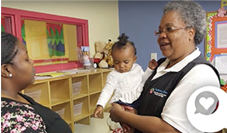
Center on the Developing Child, Harvard University | Social-Emotional Behavior
URL: http://developingchild.harvard.edu/
Early childhood is a time of both great promise and considerable risk. Assuring the availability of responsive relationships, growth promoting experiences, and healthy environments for all young children helps build sturdy brain architecture and the foundations of resilience.
- Let’s Tell the World About #ServeAndReturn! Jul 2019
 Did you see the video of the father and his baby on social media talking to one another? It was not only entertaining, but also a great example of “serve and return.” The Center for the Developing Child is taking full advantage of this video and has included the video in it’s framework for explaining ‘serve and return’.
Did you see the video of the father and his baby on social media talking to one another? It was not only entertaining, but also a great example of “serve and return.” The Center for the Developing Child is taking full advantage of this video and has included the video in it’s framework for explaining ‘serve and return’.
- Having a conversation with Dad (Video) Jun 2019 | Length: 1:25 mins
- What is Early Childhood Development? A Guide to the Science Mar 2019
This guide leads you through video and research resources that bring to life the importance and scientific rationale for investing in early childhood as well as providing strategies for service providers, teachers and families. - Training Module: Talk with Me Baby
 Learn how to empower and support families so that they can engage in meaningful conversations with their young children and advance their language and lifelong learning. The eight-session “Talk With Me Baby” course, which includes multimedia content from the Center on the Developing Child, is open to the public and available through Cox Campus and Read Right from the Start, a program of the Rollins Center for Language & Literacy.
Learn how to empower and support families so that they can engage in meaningful conversations with their young children and advance their language and lifelong learning. The eight-session “Talk With Me Baby” course, which includes multimedia content from the Center on the Developing Child, is open to the public and available through Cox Campus and Read Right from the Start, a program of the Rollins Center for Language & Literacy. - 5 Steps for Brain-Building Serve and Return
Child-adult relationships that are responsive and attentive—with lots of back and forth interactions—build a strong foundation in a child’s brain for all future learning and development. This is called “serve and return,” and it takes two to play! Follow these 5 steps to practice serve and return with your child.
-
Additional Resources from Center on the Developing Child
- 8 Things to Remember About Child Development
- The Spectrum of Neglect: Four Types of Unresponsive Care
Using science as a guide, this interactive chart delineates four types of diminished responsiveness and their consequences in order to provide a useful framework for developing more effective strategies to protect vulnerable children from this complex challenge. The four short video clips below, each under a minute in length, are excerpts from the 6-minute video InBrief: The Science of Neglect. The chart is based on a graphic from The Science of Neglect: The Persistent Absence of Responsive Care Disrupts the Developing Brain, a Working Paper from the National Scientific Council on the Developing Child.- Enhancing and Practicing Executive Function Skills with Children from Infancy to Adolescence
Executive function and self-regulation (EF/SR) skills provide critical supports for learning and development, and while we aren’t born with these skills, we are born with the potential to develop them through interactions and practice. A new 16-page guide describes a variety of activities and games that represent age-appropriate ways for adults to support and strengthen various components of EF/SR in children. Each chapter of this guide contains activities suitable for a different age group, from infants to teenagers. The guide may be read in its entirety (which includes the introduction and references) or in discrete sections geared to specific age groups. - Downloadable resources including 8 Working Papers
- Tipping the Scales: The Resilience Game Have fun while testing your knowledge of the most effective ways that communities can build resilience in children.
- Building Core Capabilities for Life (PDF)
This report combines research from the biological and behavioral sciences with practical, on-the-ground knowledge from working with adults and families to provide effective solutions for helping individuals develop more effective skills for coping with adversity.
- Enhancing and Practicing Executive Function Skills with Children from Infancy to Adolescence